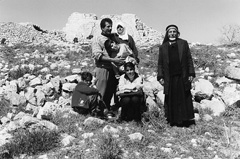until when . . .
la wakt’aich . . . PALESTINE, USA / 2004 / Arabic / Color, B&W / Video / 76 min
PALESTINE, USA / 2004 / Arabic / Color, B&W / Video / 76 min
Director, Editing: Dahna Abourahme
Photography: Annemarie Jacir, Suzy Salamy
Sound Design: Jesse Ehredt
Music: Kamran Rastegar, Zafer Tawil
Producer: Annemarie Jacir
Co-Producer: Suzy Salamy
Production Company: falafel daddy productions
World Sales: Arab Film Distribution
Each of the families living in the Dheisheh Palestinian refugee camp near Bethlehem has their own unique past. Although they continue to hold the right to return home, they hesitate between the image of Palestine in their minds and this surrogate home under their feet. Families that span three generations, ordinary conversations between siblings and spouses, images of young people trying hard every day to do their jobs, teenagers looking after their younger brothers, and the little known history of female activists—in these things we are shown what is eliminated from mass media reports of the Israel-Palestine issue: the individual faces of Palestinians, and their everyday sorrow, anger and joy.
[Director’s Statement] The outbreak of the second Intifada in September 2000 saw an intensifying of the situation in Palestine/Israel. In the U.S., there was growing activism and awareness about the issue, yet the media mostly portrayed Palestinians as terrorists. As Palestinian filmmakers based in New York we felt a need to address this image bias. We hoped to put a human face to Palestinian refugees, those at the core of this issue.
The original vision had a much broader sweep; to follow refugee families in several countries. In the summer of 2001, I conducted a video workshop at a youth center in Dheisheh Refugee Camp near Bethlehem. There, I met the four families now at the heart of this film.
In the next month, as they shared their lives with us, I was captivated. Each had something unique to add to this place called Dheisheh, and to do their stories justice it was important to allow them their due time and course. It seemed wiser to abandon the broader sweep for a more local in-depth look. We returned again in the winter of 2002, and spent another month with them.
The film developed into a slice of life spanning three generations. What I hope to convey is the way these families live the details of the everyday, and the everyday ways in which they are able to find hope, laughter, generosity and forgiveness despite the anger, pain and sadness. It is this very human and very universal face that demands to be seen.
 Dahna Abourahme
Dahna Abourahme
Dahna Abourahm is a New York-based filmmaker who grew up in Abu Dhabi and Amman. She teaches video to youth and has been involved in several community art projects. Works include sound recording for 500 Dunam on the Moon and Like Twenty Impossibles. until when . . . is her first feature. |
